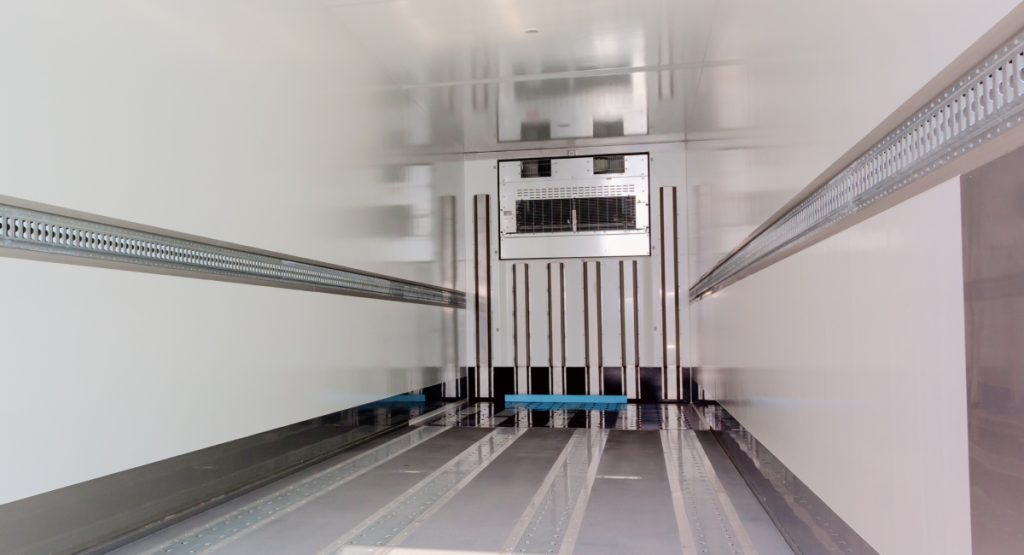
Have you ever wondered how your grocery store stays stocked in perishable and frozen foods year-round? It wouldn’t be possible without refrigerated trucking. Beyond food and grocery manufacturers, a surprisingly wide variety of industries, from plant nurseries to pharmaceutical companies, now rely on refrigerated trucks and cold-chain logistics.
While refrigerated shipping is a necessity for many types of manufacturers, the logistics behind temperature-controlled shipping can be complex, and for businesses that depend upon their reliability, the stakes can be high.
There are two basic types of refrigerated shipping: refrigerated trucks, also called “reefers,” and refrigerated boxes.
Reefers are high-tech, semi-trailers that are built equipped with temperature control technology, allowing their entire interior to be set at specific, refrigerated temperatures. A typical reefer truck can be kept at a set temperature ranging from 50 degrees to -20 degrees Fahrenheit, equipping it to safely transport a wide range of temperature-sensitive goods in large quantities.
Refrigerated boxes, (fridge boxes,) are individually refrigerated containers, generally holding up to two pallets worth of commodities. These can be shipped on trailers that are not temperature controlled, which can serve as an alternative shipping option for manufacturers with smaller shipments.
Beyond needing goods to stay at a precise temperature during shipment, manufacturers of perishable goods often have limited time windows for delivery. Tight scheduling is one of many factors that make refrigerated trucking logistics complex.
Also known as “cool chain logistics” or “chill chain logistics,” cold chain logistics is the name of the system of steps in a temperature-controlled supply chain. From the time refrigerated goods leave the production site, to when they arrive at their final destination, it’s critical that logistics are in place to make sure those goods stay at a precise temperature every step of the way and are delivered within their appropriate time frame.
What does a typical cold supply chain look like? Beginning with a refrigerated production area, goods are usually stored in refrigerated warehouses, transported with temperature-controlled vehicles or in refrigerated containers, and received into refrigerated storage upon arrival at their final destination. If a manufacturer is shipping a large quantity of perishable items to multiple locations, a stop at a depot might be necessary before the goods are re-routed on separate vehicles to their final destinations. Special steps could be needed to ensure temperature control is maintained in the transfer of goods from truck to truck. Every single step of the process is a “link” in the cold chain and needs to be planned carefully in order for temperature-sensitive goods to maintain their integrity upon arrival at their destination.
The more “links” there are in an item’s cold chain, the higher the stakes are for the manufacturer. If any one “link” fails in the cold supply chain process, the entire shipment of goods could be ruined and manufacturers could find themselves facing substantial losses. This is why it’s critical to choose a trusted, highly-rated logistical company to coordinate refrigerated shipping.
With so many complexities to consider, it’s critical that manufacturers choose a trustworthy, highly-rated logistics partner with a deep understanding of the complexities involved in cold chain logistics.
At Surus, we select only the most reliable and efficient reefer transportation suppliers.
Our drivers are always fully bonded and insured for the transportation of temperature-sensitive goods. We take every precaution to ensure our refrigerated trucks and vans provide the exact temperature control and conditions needed to meet our customers’ specific expectations.
We know time is of critical importance when shipping refrigerated goods, so we carefully coordinate and track shipments to ensure deliveries are on time.
If you are looking for a dependable, trustworthy logistics partner with years of experience, or are interested in learning more about refrigerated trucking, we’d love to connect with you!